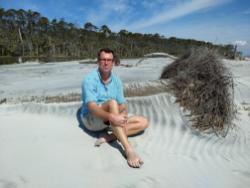Sustainability and Culture in Germany
Program Details
- Location: Berlin, Goslar, Lüneburger Heide, Husum, Hamburg, Germany
- U.S. State Department Travel Information for Germany
- U.S. State Department COVID-19 Information for Germany
- Program Dates: May 8 - June 3, 2022
- Travel Dates: May 18 - June 3, 2022
- Cost: $2603 plus tuition and out-of-pocket expenses
- Online Application
Students will gain exposure to German historic and contemporary cultural values related to the environment and to generally accepted sustainability practices through readings, lectures, and discussions prior to travel. However, travel to Germany is crucial in order for students to observe first-hand practices related to coastal sustainability in modern, industrial, densely populated region in central Europe, and to engage with individuals in a different cultural setting. Dialog with German residents (lay people) and practitioners in the field will be an integral part of the program, as will the observation aspects of everyday urban and rural life that are directly related to sustainability. The direct comparison between the coastal lowland regions in South Carolina and Northern Germany, both exposed to comparable issues and demands, will allow the students to reflect on the different approach to address these challenges.
Before departure to Germany, nine days will be spent at CCU and sites in Horry and Georgetown counties. Day trips will bring the group to urbanized and pristine coastal areas in order to familiarize students with local issues, needs, and solutions in regard to sustainability. During the nine days prior to travel abroad, students will also read and discuss German culture and environmentally-related texts in English translation.
In Berlin students will take a tour of the Reichstag (parliament) and learn about the German parliamentary system, visit the collection of Romantic paintings in the museum at Charlottenburg Palace, and explore the cultural landscape of Frederik the Great’s Sansouci palace and gardens; They will learn and discuss the various sustainable (and unsustainable) solutions regarding energy production and usage, water/sewage management, individual vs public transportation, food resources in the realm of a 3.5 million residents city.
The students will experience public outdoor life through bike tours and other outdoor activities in Berlin, hiking the Harz Forest, and walking through the Luneberger Heide and the coastal landscapes (marsh, tidal flat) along the North Sea. They will learn and discuss how the landscapes have naturally formed (geology, hydrology, climate) and how human activities have modified these landscapes historically over the past 300 years and in a modern, highly developed society after World War II.
In addition, students will visit several historical sites, including the UNESCO World Heritage Rammelsberg ore mines near Goslar, the Hamburg Harbor, and the Eidersperrwerk coastal protection facilities. They will compile the various sustainable technical solutions but also the general societal education, acceptance and behavior regarding resource exploitation and management of energy, water, waste, forests, soils, etc.
Students will engage in dialog with German students in Berlin on topics of sustainability and will observe practices of coastal living on a “hallig” (North Sea coast island that can be reached by land during low tide).
In this program, students will engage first-hand with sustainability practices in Germany and make direct comparisons with practices in coastal South Carolina. They will approach sustainability through an interdisciplinary perspective that acknowledges regional landscapes and climate, cultural values and social institutions as crucial components that contribute to individual and societal attitudes that embrace various sustainable community strategies. Students are thus required to enroll in both HONR 302/LIS 330: Sustainability in German Culture and HONR 304/IDS 302 Anthropogenic Landscapes and Sustainability in Germany. They will learn not only about the technological solutions to address sustainability demands but also become familiar with historical and contemporary concepts of German culture by participating in aspects of daily life such as hiking, bicycling in an urban setting, outdoor recreational activities, attending cultural events, and visiting examples of cultural landscapes such as the Sanssouci Palace and gardens in Potsdam, the Harz mountains, and traditional coastal communities along the North Sea.
Prior to departure, students will visit coastal sites near CCU and become familiar with local sustainability issues, demands, and practices so that they can make direct comparisons with practices in Germany.
Course Information
Students must register for 6 credits. Note the cross listing below. (Ex. HONR 302 and HONR 304 OR LIS 330 and IDS 302).
HONR 302/LIS 330: Sustainability and Place in German Culture
Course Instructor: Gary Schmidt
Credits Offered: 3
Prerequisite: Need to co-enroll in HONR 304/IDS 302 Anthropogenic Landscapes and Sustainability in Germany
This class will examine artifacts and practices of German culture that engage with the relationship between human beings and their natural environment and provide a place-based foundation for sustainability practices in contemporary German society. Students will be required to make active comparisons between representations, values, and practices in contemporary German society. Students will be required to make active comparisons between representations, values, and practices in Germany and in the United States. This is a study-abroad course that will require dull participation in all outings and activities that are part of the travel portion of the course. The class is taught in English and no knowledge of German is required.
HONR 304/IDS 302 Anthropogenic Landscapes and Sustainability in Germany
Course Instructor: Till Hanebuth
Credits Offered: 3
Prerequisite: None
This course will examine the natural and anthropogenic landscaping in coastal lowlands that engage with the relationship between human beings, their societal mentality, and their natural environment, and provide a place/culture-based foundation for sustainability practices in contemporary South Carolina and German societies. Students will be required to make active comparisons between representations, values, and practices in Germany and in the Southeastern US. This is a study-abroad course that will require full participation in all outings and activities that are part of the travel portion of the course. The class is taught in English and no knowledge of German is required. The overarching goal of this course is to develop an understanding of natural and human-made landscapes and environmental processes that had major influence on the collective societal reception of environmentally and community relevant topics and issues. The driving question is how social exposure to and historic experience of both a specific regional environment and climate determine the mindset of a society that leads to a characteristic public support for sustainability and related decisions. We will directly experience compare in detail, and controversially discuss 300 years of environmental history of the two contrary regions: coastal South Carolina and coastal northern Germany. The landscapes will be experienced from different perspectives: their natural origin (geological past), their anthropogenic modification (early modern settlements), and their management in a modern industrial nation. WE will look at a variety of sustainable programmatic subjects; coastal protection, environmental protection, waste production and management, food production and quality, water usage, energy production and usage, ways of transportation.
Program Leaders
 Dr. Till Hanebuth, Associate Professor of Coastal and Marine Geology
Dr. Till Hanebuth, Associate Professor of Coastal and Marine Geology
thanebuth@coastal.edu, 843-349-2753
Dr. Hanebuth is a coastal and marine geologist who received his academic education and professional experience at German universities in Hamburg, Marburg, Keil, and Bremen, two of them being internationally recognized R1 institutions. His specialization is in coastal and marine systems and the influence of local human communities have on the health and functionality of these systems. Hanebuth teaches a variety of PhD, master’s and undergraduate courses on coastal and marine science topics. He is also a member of the UN Regional Centre of Expertise for Education on Sustainable Development, Georgetown. He has developed strong research activities since arriving at CCU, focusing particularly on issues and demands in Georgetown County. These projects are characterized by intense student involvement. Dr. Hanebuth has led various student abroad programs while he was at German universities, particularly to Austria and Denmark. He grew up in northern Germany and lived in the cities of Hamburg, Kiel and Bremen for more than 30 years. Having received his education in natural science there, he is extraordinarily familiar with the various regions, the local environments, the transportation system, and the local people.
 Dr. Gary Schmidt, Professor of German, Chair LIS
Dr. Gary Schmidt, Professor of German, Chair LIS
gschmidt@coastal.edu, 843-349-2741
Dr. Schmidt, Professor of German and Chair of Languages and Intercultural Studies Department, holds a PhD in German Literature from Washington University in St. Louis. He has taught at a number of colleges and universities in the United States as well as the University of Stuttgart in Germany. His area of research specialization is German literature and film of the twentieth and twenty-first centuries, with an emphasis on gender and sexuality. At CCU, he teaches German language and culture at all levels of the undergraduate curriculum, as well as cross-disciplinary and interdisciplinary courses. He has published extensively on German literature and film, co-edited anthologies, and translated German fiction and non-fiction into English. Dr. Schmidt has been leading study abroad programs to Germany for over 20 years, having accompanied students to such locations as Göttingen, Berlin, Flensburg, Oldenburg, Bayreuth, and Vienna. Most recently, he co-led the "Coastal in Berlin" program in May 2018 with Dr. Amanda Brian. He has near-native fluency in German.
Cost to Participate = Program Fee ($2603) + Tuition ($2496) + Technology Fee ($30) + Out-of-pocket Expenses ($2519)
The tuition for this program is for Maymester term.
Included in Program Fee: Accommodatioins while in country; two group dinners; local transportation; planned excursions; and emergency medical insurance.
Out of Pocket Expenses:
- Tuition ($2496)
- Airfare (Estimated at $1700)
- Estimated out-of-pocket expenses: $474 for meals, $145 passport cost and $200 for COVID-19 testing (as required for entry/reentry)
| Discounted Tuition for Education Abroad Students: $416/credit | |||||
| CCU credits | Program Fee | Tuition | Technology Fee ($5/credit) |
Out-of-pocket Expenses (estimate) |
Cost to Participate |
| 6 credits | $2603 | $2496 | $30 | $2519 | $7648 |
Payment Schedule
| Payment | Due Date | Amount Due |
| Deposit | Oct. 27, 2021 | $300 (refundable until commitment deadline Dec. 4, 2021) |
| Remaining Program Fee Payment | Feb. 11, 2022 | $2303 |
| Tuition and Technology Fee Payment | May 7, 2022 | $2526 (see above) |
After acceptance to the program, the payment of the program fee as well as payment of tuition can be made online through WebAdvisor or in-person/by phone through Student Accounts. Tuition charges are distinct and different from program fee charges. Please note that payments made with a debit or credit card will be charged a non-refundable service fee of 2.7 percent. For more information about methods of payment, visit Student Accounts.
Current Travel Conditions:
- CIA World Factbook
- U.S. State Department Travel Information
- U.S. State Department COVID-19 Information
- CDC Health Information
CCU Travel Resources:
Resources:
- Know Your Travel Risk
- US Embassy Updates – COVID-Related Restrictions on Returning to the USA
- US Embassies – Country Specific COVID-Regulations for Entry and Stay by Country
- S. Department of State(DOS)
- Smart Traveler Enrollment Program (state.gov)
- Centers for Disease Control and Prevention(CDC)
- Overseas Security Advisory Council (OSAC)
- International Air Transport Association (IATA)
- Traveler’s Checklist (US Department of State)
- FBI Safety and Security for US Students Traveling Abroad
- World Health Organization (WHO)
- TripPrep


